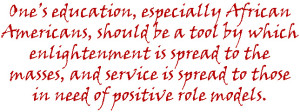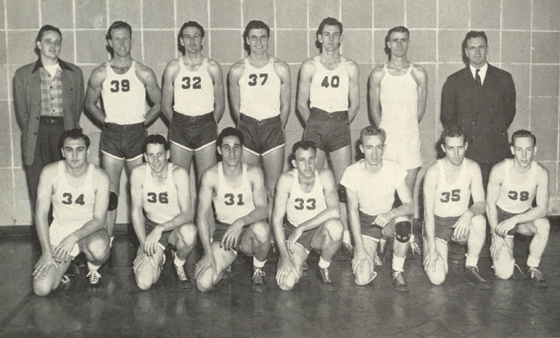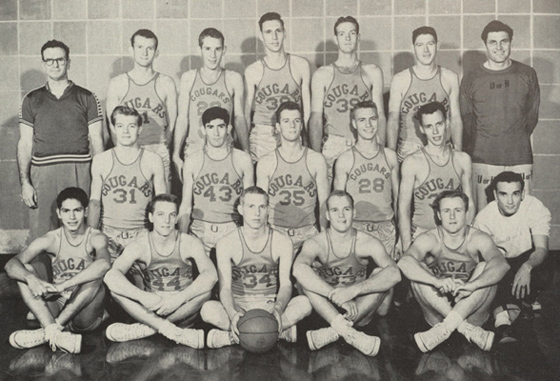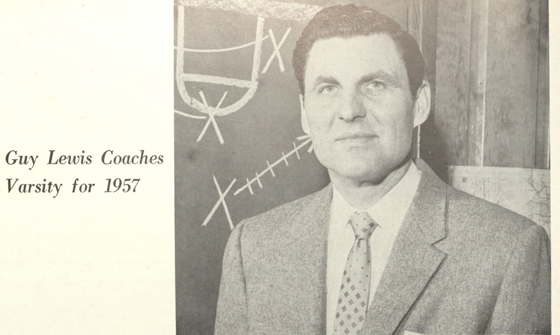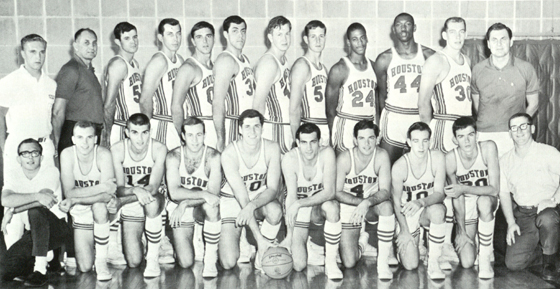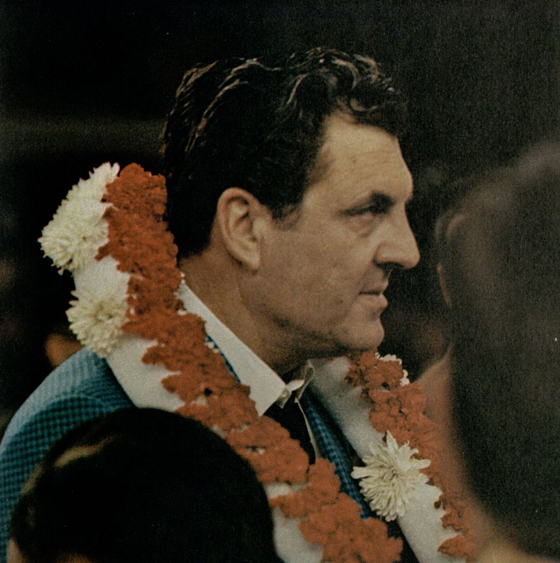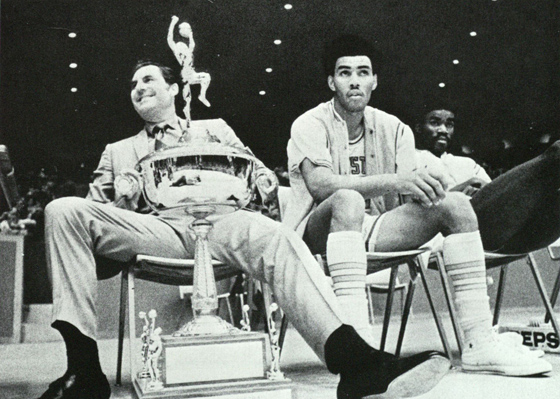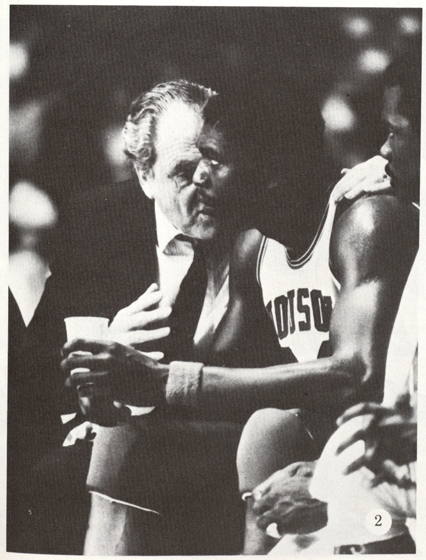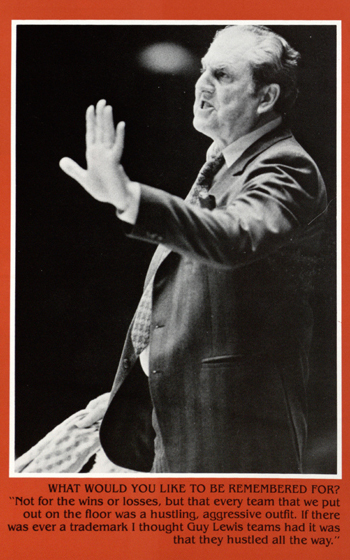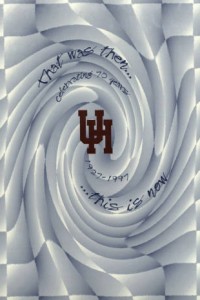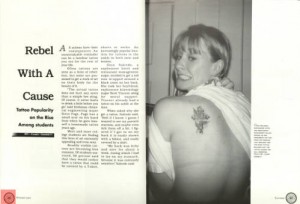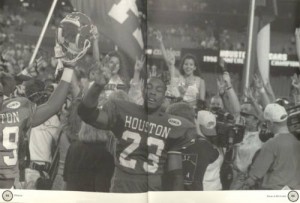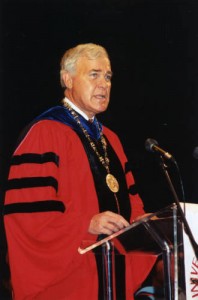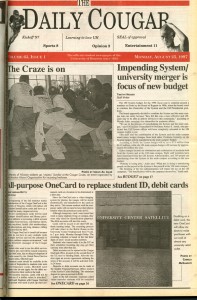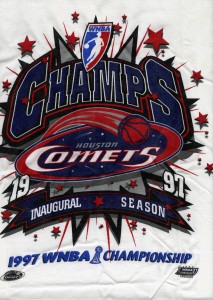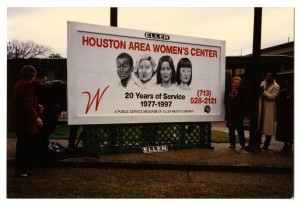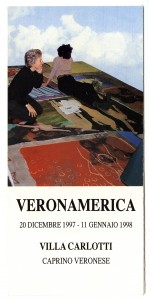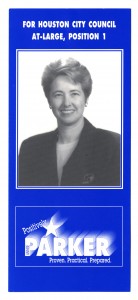
This spring 2016 semester we are proud to partner once again with the English Department’s Professional Internship Program and host Elizabeth Beaver, our newest UH Special Collections Social Media Intern. As part of her duties, Beaver will be researching, drafting, and editing content for the Special Collections blog as well as our Facebook page. In her first contribution, she examines the founding and evolution of African American Studies at the University of Houston.
1969: The Dawn of a Trailblazing Academic Program
Elizabeth Beaver
Today, I would like to pay homage to our very own African American Studies Department which has its roots in the civil rights movement of the 1960s.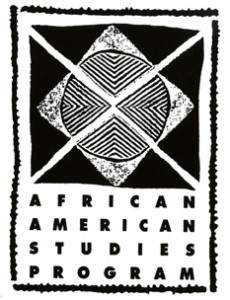
The 1960s were a time of intense civil rights activism which generated a great deal of momentum for issues of racial equality. In comparison to the national ferocity, the citizens of Houston presented a more subdued and subtle front. A city-wide media blackout and backroom negotiations allowed the city to quietly take on the task of integrating its large, commercial establishments without the horrific scenes of violent clashes taking place in other Southern cities. Despite this compromised and negotiated “peace” of the period, University of Houston students’ demands for changes in the curriculum found them standing at the fore of the evolution of Liberal Arts education in the South. In 1969, dissatisfied with the status quo, the student organization Afro-Americans for Black Liberation (or AABL) presented University President Philip Hoffman with a list of ten demands. The 1969 Houstonian reports that the so-called demands included “more black administrators and instructors,” “a raise in the pay scales for maintenance employees,” as well as the establishment of “an Afro-American studies department.” The University rose to the demands of the students, as well as the changing social climate of the city itself, and launched a number of African American Studies courses in the spring of 1969.
Exploring a new field of study, the African American Studies Program actively invited interest and education in an important cultural field that had previously been entirely sidelined. In an era rich with advocacy and public protest, the University of Houston was quick on the heels of the first program in the nation (offered by San Francisco State University in 1968), and was the first in Texas and the Southeastern United States to offer one of these trailblazing programs.
The value of education may be a given. However, the establishment of the African American Studies Program illustrated this importance in two ways: 1) It provided expanded educational opportunities to individuals (of all colors and creeds) in a field of study that had reached a critical mass of interest and demand and 2) exemplified that education served a larger, societal impact, given the previous marginalization of scholarship related to the African American experience.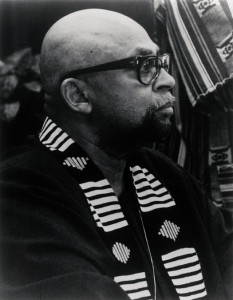
Over the years, the AAS Program has hosted many notable speakers, including highly acclaimed scholar and writer Dr. Maulana Karenga, astronaut and former UH Graduate Bernard A. Harris, and many other distinguished leaders. Our archives contain records from when Dr. Karenga came to speak in February of 1995, and include travel details and information related to the talk and panel, “Black Studies, Social Policy and Social Practice: Joining Campus and Community.” As a prominent scholar in his field, astronaut, and UH graduate, Bernard Harris was invited to the university by the AAS Program to give a talk in January of 1994. Only a year later he was a member of NASA’s STS-63 Crew and became the first African American to take part in Extravehicular Activity or “EVA” (NASA nomenclature for a spacewalk)! The organization plans and details for his campus talk can be found in our African American Studies Records. The folder contains, among other things, personal details and biographical information, education and honors received, as well as mission highlights from the time he logged in space. We also have a video interview of Harris (available digitally, as well) if you are interested in learning more about this esteemed astronaut and UH alum.
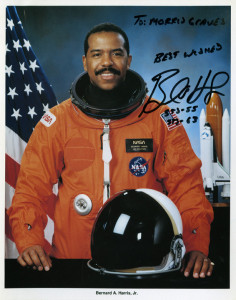 The current African American Studies Department is the result of significant growth over numerous decades and the recent efforts by university authorities. In March of 2014, CLASS Dean John W. Roberts appointed a task force dedicated to the growth and development of the AAS Program. By the next year, it was a fully formed department making plans for African American History Month. The current department has big plans for this year as well, now boasting a wide selection of courses and opportunities for community outreach. The department enjoys a longstanding study abroad relationship with Gambia, as well as numerous scholarship offerings. The department has grown to match the needs of the University and the city as they develop and change, and it continues to impact Houston’s diverse cultural environment in increasingly positive ways. The program organizes many different off and on-campus talks and events as well as community involvement opportunities, and has hosted numerous visiting scholars over the years.
The current African American Studies Department is the result of significant growth over numerous decades and the recent efforts by university authorities. In March of 2014, CLASS Dean John W. Roberts appointed a task force dedicated to the growth and development of the AAS Program. By the next year, it was a fully formed department making plans for African American History Month. The current department has big plans for this year as well, now boasting a wide selection of courses and opportunities for community outreach. The department enjoys a longstanding study abroad relationship with Gambia, as well as numerous scholarship offerings. The department has grown to match the needs of the University and the city as they develop and change, and it continues to impact Houston’s diverse cultural environment in increasingly positive ways. The program organizes many different off and on-campus talks and events as well as community involvement opportunities, and has hosted numerous visiting scholars over the years.
We invite you to come by the reading room to catch a few exciting glimpses into the history of this exemplary academic program via the the University Archives and the African American Studies Records!
University of Houston basketball legend Guy Vernon Lewis II was laid to rest today. Lewis passed away on Thanksgiving, November 26, 2015, in Kyle, TX at the age of 93. To say Houston Cougar basketball is indebted to Coach Lewis is to tiptoe around a libelous understatement. From when he first laced up his sneakers for the Red and White in 1946, through his retirement from coaching in 1986, and into his enduring presence and counsel in his later years, Cougar basketball, athletics, and the University itself were forever changed by his decades of service and devotion. Inducted into the Basketball Hall of Fame in 2013, Lewis saw his teams lay claim to two Southwest Conference championships, four SWC tournament championships, five Final Four appearances, and tally 592 wins under his tenure as head coach of the Cougars.
A snapshot history of Guy V. Lewis and the University of Houston
- 1946: Fresh from his service in World War II, Lewis (#37) begins his playing career with the 1946 Lone Star Conference champion Houston Cougar basketball team. (Houstonian)
- 1953: Lewis (back row, far right) joins the Cougars as an assistant coach. (Houstonian, 1954)
- 1956: Coach Alden Pasche announces his retirement and the University of Houston names Guy V. Lewis as the program’s new head coach. He would serve in that role for the next thirty years. (Houstonian, 1957)
- 1966: While Warren McVea was turning heads for Coach Bill Yeoman’s gridiron Coogs, Lewis (back row, far right) recruits Don Chaney (#24) and Elvin Hayes (#44) were integrating Houston Cougar basketball (Houstonian). For more on UH and Lewis’s role in integrating intercollegiate athletics in the South, see the new book from Robert Jacobus, Houston Cougars in the 1960s: Death Threats, the Veer Offense, and the Game of the Century.
- 1968: Coach Lewis victorious following the Game of the Century (Houstonian). In front of more than 52,000 fans in the Astrodome and millions more on national television (a first for a regular season college basketball game), the #2 Houston Cougars remain undefeated, ending the 47 game winning streak of Coach John Wooden, Lew Alcindor, and the #1 UCLA Bruins. Coach Lewis would call it the greatest thrill of his career.
- 1969: Coach Lewis enjoys the post-tournament ceremonies in the wake of a Cougar victory in the Bluebonnet Classic. (Houstonian, 1970)
- 1977: Coach Guy Lewis shakes hands with President Philip G. Hoffman (right) following victory in the NIT semi-finals. (UH Photographs Collection, Madison Square Garden, NY)
- 1984: Coach Lewis and Hakeem Olajuwon talk strategy. (Houstonian). In the early 1980s Texas’ Tallest Fraternity is born as “Akeem” Olajuwon, Clyde Drexler, Michael Young, and the rest of Phi Slama Jama help propel the Cougars to three straight Final Four appearances from 1982 to 1984. Lewis championed their up-tempo, above-the-rim style noting that slam dunks (once outlawed in college basketball) are “high-percentage shots.”
- 1986: Four decades after his playing days started here, Guy V. Lewis announces his retirement from coaching at the University of Houston. On being asked what he would like to be remembered for, Lewis said, “Not for the wins and losses, but that every team that we put out on the floor was a hustling, aggressive outfit. If there was ever a trademark I thought Guy Lewis teams had it was that they hustled all the way.” (Houstonian)
The Beloit College Mindset List, a must-read for anyone who wants to feel time quickly slipping away, was recently published for the incoming collegiate freshman class, the majority of which were born in that magical year of 1997 (?!). While it might make some of us feel just a little bit older, the list is worth a read and always provides some eye-opening perspective.
Ron Nief, Tom McBride, and Charles Westerberg (the creators of the list) provide some real marvels, reminding us that, “Among those who have never been alive in their lifetimes are Princess Diana, Notorious B.I.G., Jacques Cousteau, and Mother Teresa.” They came into the world around the same time as Dolly the sheep and Michael “Prince” Jackson, Jr. In addition, these young’uns have never licked a postage stamp (#3) and, frankly, it can get a little confusing when old people say, “around the turn of the century” (#17). The one that makes these old bones ache a little more this evening? “The eyes of Texas have never looked upon The Houston Oilers.” (#26)
In a salute to the University of Houston Cougars Class of 2019, we have gone digging through the archives and share with you a few highlights from the year 1997 housed here at your University of Houston Special Collections.
And, no, we’re not trying just to make you feel old.
- In 1997 UH celebrated its 70th anniversary, visualized here on the cover of the Houstonian. “That was then… this is now.” (Houstonian Yearbook Collection)
- Rebel With A Cause: The 1997 Houstonian explores the rising popularity of tattoos among students. (Houstonian Yearbook Collection)
- Featured in the 1997 Houstonian is the 1996 Cougar Football team. Playing most of their home games in the ol’ Astrodome, the Coogs finished the season 7-5, winning a share of the C-USA title, and earning a Liberty Bowl berth. In 1997, however, the team finished a disappointing 3-8. (Houstonian Yearbook Collection)
- Dr. Arthur K. Smith became the sixth Chancellor of the University of Houston System and the 11th president of the University of Houston on April 1, 1997. He was the first to hold the titles of chancellor and president simultaneously. (UH Photographs Collection)
- The Daily Cougar welcomed students back with news of a new “OneCard” allowing students “to make purchases without cash at almost any university retail outlet.”
- The WNBA debuted in 1997 and the Houston Comets would go on to win the first of three straight championships. (Houston Comets Memorabilia Collection)
- Bling-bling! Pen & Pixel Graphics captured the aesthetic of 1997 in album and promotional artwork. (Pen & Pixel Graphics, Inc. Records)
- The Houston Area Women’s Center celebrated their 20 year anniversary in 1997. (Houston Area Women’s Center Photographs)
- The Houston Gorilla Girls opened “Veronamerica” in Italy, December 1997. (Houston Gorilla Girls)
- In 1997 Annise Parker won a runoff election for Houston City Council At-Large position 1, becoming Houston’s first openly gay elected official. (Annise Parker Papers)
The following comes to us courtesy of Julia Taylor, Graduate Fellow of the Carey C. Shuart Women’s Archive and Research Collection.
While Friday’s SCOTUS ruling on marriage equality marks a milestone in the struggle for LGBTQIAP rights, Special Collections’ booth at this year’s Houston Pride documented the genealogy of LGBT activists who set the stage for this historic win.
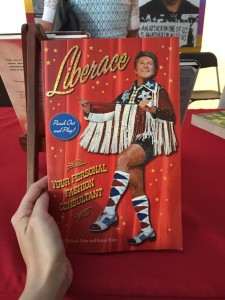
Edward Lukasek’s copy of Liberace: Your Personal Fashion Consultant, a book of Liberace paper dolls emblazoned with life mottos, was a crowd-pleasing favorite.
This year’s Pride festival and parade took place in downtown Houston instead of the usual shady Montrose locale, making the air-conditioned atmosphere of the LGBT History tent a welcome respite from the Texas heat. Special Collections proudly exhibited rare books and artifacts from the Edward Lukasek Gay Studies Collection and the Norma Lee Gay Studies Collection, as well as papers and ephemera from the Houston Area NOW Collection, the Debra Danburg Papers, and the Kanellos Latino Literary Movement Book Collection. Library staff and volunteers stood by to answer questions and show support as families, couples, and friends perused the display of historical and literary materials.
The LGBT history tent, which was sponsored by AT&T, also housed exhibits from Rice University Special Collections, the Botts Collections of Lesbian, Gay, Bisexual, and Transgender History, the Houston Public Library, and the Old Lesbian Oral Herstory Project. To learn more about the history of Houston Pride, visit their website.
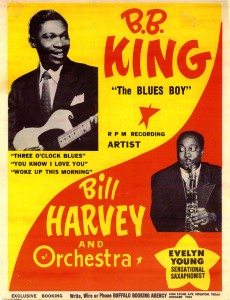
promotional poster for B.B. King and Bill Harvey & Orchestra (Texas Music Collection)
Today marks the last day of visitation before the King of Blues is laid to his final rest at the B.B. King Museum and Delta Interpretive Center. On hearing the news of this music legend’s passing nearly two weeks ago, one could not help but pause and reflect on his storied career that made him synonymous with the blues and even extended his broad cultural imprint beyond music. Here at the University of Houston Special Collections, Houston and Texas History Archivist Vince Lee shared some of his ongoing work as part of a digitization project and its surprising connection to B.B. King.
The Texas Music Collection contains research files on the history of Texas music, with an emphasis on the musicians and record labels of the mid-twentieth century. There among the newspaper clippings, songbooks, and financial records, Lee points out, are promotional photographs of some of the most renowned musicians to call Houston home–including the late B.B. King.
King’s brand of the blues may always be associated with Beale Street and his deep Memphis roots, but the reasons why his photograph might show up in an archival box in Houston are likely less well-known. A recent piece in the Houston Press by Chris Gray is an excellent primer on the King-Houston connection and references the research of Dr. Roger Wood (author of Down In Houston: Bayou City Blues) on the role music business mogul Don Robey played in King’s connection to Houston.
Founder of Peacock Records, the Houston native Robey acquired Duke Records (previously based in Memphis) with the same business aplomb that marked his other interests and acquisitions, giving him easy access to a roster of talented Memphis-based musicians and industry connections. Among those connections was a young B.B. King. Though King never signed with Duke/Peacock, it was natural that the Houston-based Buffalo Booking Agency representing B.B. King (also owned by Robey) would help stock his touring band with musicians from Robey’s many record labels and with plenty of what Wood calls that “Texas tenor, big-band sound.” These tours, Wood argues, maximized B.B. King’s exposure to audiences and were critical in his professional success.
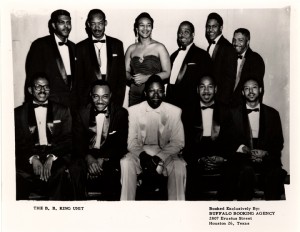
promotional photograph for the B.B. King Unit (Texas Music Collection)
Materials from the Duke/Peacock label feature prominently in the Texas Music Collection and promotional photographs from the Buffalo Booking Agency are not hard to find. One promotional photograph for the B.B. King Unit features a very young-looking luminary flanked by his band, including vocalist Mildred Jones (booked exclusively by Buffalo Booking, Houston, TX, the fine print reminds us).
These promotional photographs, that also include other greats like Junior Parker, “Gatemouth” Brown, and Johnny Ace, are another example of the surprises found in the archives on a daily basis. As we remember B.B. King, we are also thankful to have these reminders of his career and legacy. Interested researchers may request the Texas Music Collection in the Special Collections Reading Room during our normal hours of operation.
